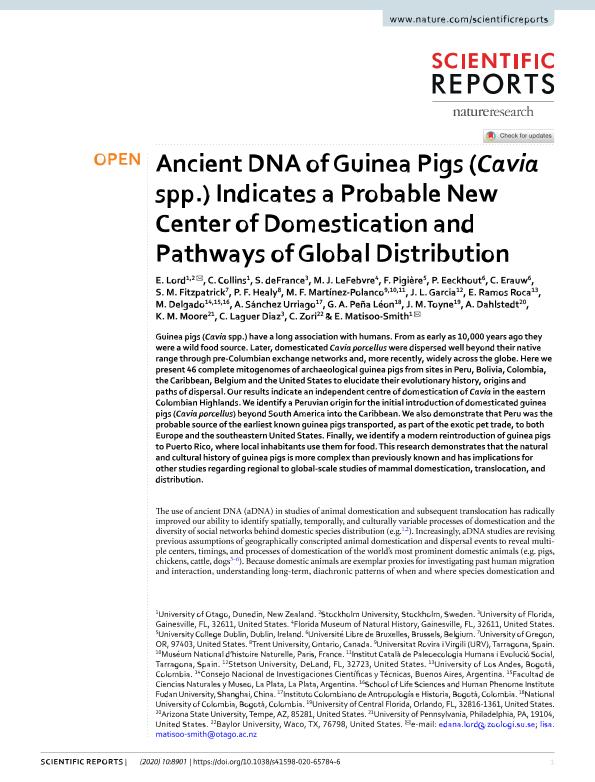Artículo
Ancient DNA of guinea pigs (Cavia spp.) indicates a probable new center of domestication and pathways of global distribution
Lord, E.; Collins, C.; deFrance, S.; LeFebvre, M. J.; Pigière, F.; Eeckhout, P.; Erauw, C.; Fitzpatrick, S. M.; Healy, P. F.; Martínez Polanco, M. F.; Garcia, J. L.; Ramos Roca, E.; Delgado Burbano, Miguel Eduardo ; Sánchez Urriago, A.; Peña Léon, G. A.; Toyne, J. M.; Dahlstedt, A.; Moore, K. M.; Laguer Diaz, C.; Zori, C.; Matisoo-Smith, E.
; Sánchez Urriago, A.; Peña Léon, G. A.; Toyne, J. M.; Dahlstedt, A.; Moore, K. M.; Laguer Diaz, C.; Zori, C.; Matisoo-Smith, E.
 ; Sánchez Urriago, A.; Peña Léon, G. A.; Toyne, J. M.; Dahlstedt, A.; Moore, K. M.; Laguer Diaz, C.; Zori, C.; Matisoo-Smith, E.
; Sánchez Urriago, A.; Peña Léon, G. A.; Toyne, J. M.; Dahlstedt, A.; Moore, K. M.; Laguer Diaz, C.; Zori, C.; Matisoo-Smith, E.
Fecha de publicación:
01/06/2020
Editorial:
Nature
Revista:
Scientific Reports
e-ISSN:
2045-2322
Idioma:
Inglés
Tipo de recurso:
Artículo publicado
Clasificación temática:
Resumen
Guinea pigs (Cavia spp.) have a long association with humans. From as early as 10,000 years ago they were a wild food source. Later, domesticated Cavia porcellus were dispersed well beyond their native range through pre-Columbian exchange networks and, more recently, widely across the globe. Here we present 46 complete mitogenomes of archaeological guinea pigs from sites in Peru, Bolivia, Colombia, the Caribbean, Belgium and the United States to elucidate their evolutionary history, origins and paths of dispersal. Our results indicate an independent centre of domestication of Cavia in the eastern Colombian Highlands. We identify a Peruvian origin for the initial introduction of domesticated guinea pigs (Cavia porcellus) beyond South America into the Caribbean. We also demonstrate that Peru was the probable source of the earliest known guinea pigs transported, as part of the exotic pet trade, to both Europe and the southeastern United States. Finally, we identify a modern reintroduction of guinea pigs to Puerto Rico, where local inhabitants use them for food. This research demonstrates that the natural and cultural history of guinea pigs is more complex than previously known and has implications for other studies regarding regional to global-scale studies of mammal domestication, translocation, and distribution.
Palabras clave:
aDNA
,
Guniea Pigs
,
Domestication
,
South America
Archivos asociados
Licencia
Identificadores
Colecciones
Articulos(CCT - LA PLATA)
Articulos de CTRO.CIENTIFICO TECNOL.CONICET - LA PLATA
Articulos de CTRO.CIENTIFICO TECNOL.CONICET - LA PLATA
Citación
Lord, E.; Collins, C.; deFrance, S.; LeFebvre, M. J.; Pigière, F.; et al.; Ancient DNA of guinea pigs (Cavia spp.) indicates a probable new center of domestication and pathways of global distribution; Nature; Scientific Reports; 10; 1; 1-6-2020; 8901-8910
Compartir
Altmétricas



